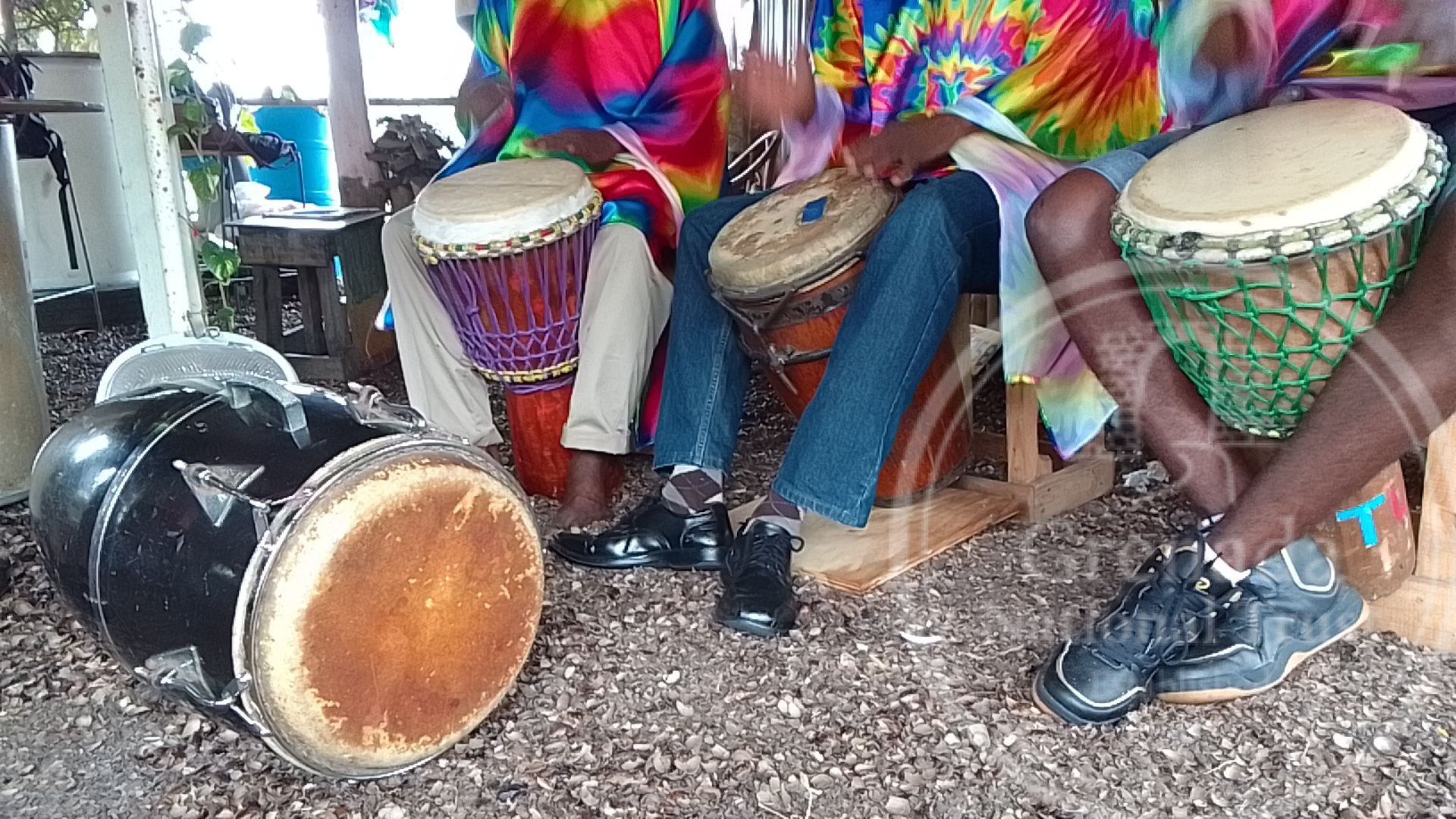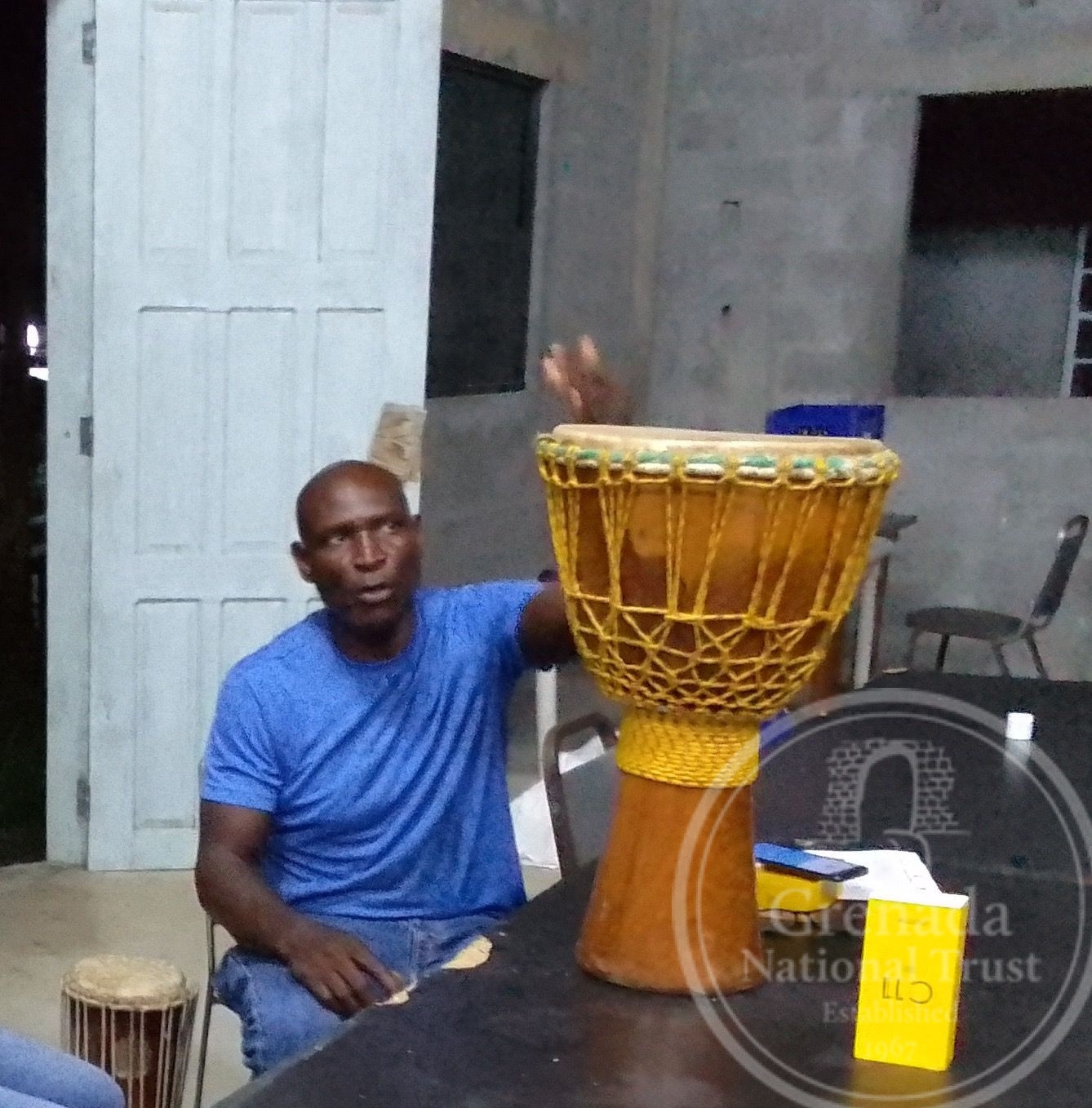
Photo Credit: Proud of my Heritage - ICH-Zone/Team No.3
According to practitioners, drumming which is an aspect of the performing arts and traditional craftsmanship, evokes a sense of freedom, jubilation and releases persons from stress and pain.
Most skilled drummers were exposed by relatives to the playing of drums from childhood and all agree that being constantly around drummers helps enhance one’s skills. Drumming performances occur throughout Grenada, Carriacou and Petite Martinique during a variety of events. Several noted communities include Calliste – St. George’s, St. George – St. George’s, Tivoli – St. Andrew and Fontenoy – St. George’s. Drumming is also very prevalent in the Maroon festival and at the Sarakas in the communities of River Sallee, La Poterie and Telescope.
Some of the well-known practitioners include Livingston Nelson, founder of the Tivoli Drumming Group, Nigel De Gale, principal of the St. George’s Anglican Senior School, Godfrey Luke, Ervin Francis, and Harlin De Gale. The Theatre of Unique Music and Dramatic Art, TUMDA, is also involved in the practice. Drumming groups have also been formed in villages like Birchgrove and Mont Horne. Some practitioners have a strong connection with the La Fillette Djab, River Sallee and La Poterie drummers. Drumming is an important part of Shango rituals.

Photo credit: Proud of my Heritage - ICH-Zone/Team No.3
One practitioner interviewed has hosted workshops in local groups and some schools in different parishes. He is not only a skilled drummer but also can build drums. He formed a drumming group in Canada, and they became part of the inaugural drum festival in Grenada on his return. Another drummer has performed in several drum festivals in many countries such as Canada, Tobago, and Guadeloupe. He has also performed at two Caribbean Festivals of Arts (CARIFESTA).
The different tools used in drum-making include gout, axes, cutlasses, and even flat-blade screwdrivers. Mango, Pear, Mahogany, White Cedar, and other trees such as coconut and breadfruit are used to make the base of the drum while the skin of goats or cows are used to create the tops. Currently, some local groups are using synthetic materials such as canvas. Plastic ropes are also used to tie the skins onto the base.
No specific costumes are associated with the playing of drums but many practitioners prefer to wear an African-like top or outfit while performing.
All practitioners interviewed are still involved in the art form and are willing to teach others what they have learnt. One practitioner collaborates with other drummers and dancers to put on a concert with the children in the community and drums with a local dance company at hotels and other venues. One practitioner believes that once a student can mimic the teacher’s rhythms with their voices, it becomes easier to play the rhythms on the drums. This was a method of teaching drumming that was proven by him in teaching and learning environments. One practitioner believes that one’s involvement in drumming will come from being around the drum and not necessarily being taught to play the drums. However, some aspects of teaching will be necessary. He proposed that drummers can collaborate to share rhythms.
Practitioners highlighted challenges which include a lack of appreciation for drummers especially when they are asked to perform at events. They also pointed to a lack of assistance from the government or other entities. Some practitioners identified a lack of cultural knowledge in communities while others pointed a perceived sense of superiority demonstrated by some drummers based on which parish they are from. The division between drummers hinders collaboration which, in turn, has resulted in information on traditions and practices not being shared among drummers within the tri-island state or within the wider Caribbean region. Collaborative efforts are also stymied by those drummers who fear losing their culture if they engage with drummers from other countries.
Some practitioners believe that young people do not have the vigor and enthusiasm to get involved in playing the drums. Lack of sponsorship from businesses and the minimal amount of monetary contribution from the government is a challenge to the continuation of the drumming and they noted that community drumming is not as prominent as before due to lack of community spirit.
To safeguard the practice and encourage future enactment and transmission of the element programmes to further the knowledge need to be implemented in schools and elders need to be brought into the process of learning and passing on the tradition. Workshops are another way in which practitioners and interested persons can learn about the practice.
Other relevant drummers visited in Grenada are Nigel De Gale, Dionel De Gale, Alim De Gale, Godfrey Luke, Irwin Francis and Livingston Nelson.

